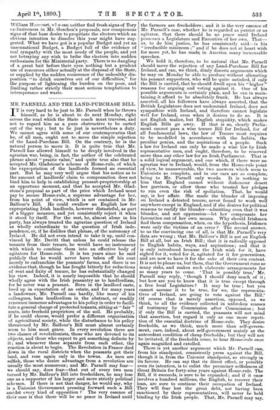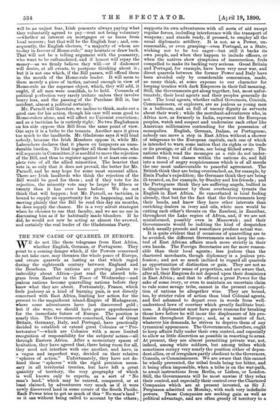MR. PARNELL AND THE LAND-PURCHASE BILL.
IT is very hard to be just to Mr. Parnell when he throws himself, as he is about to do next Monday, right across the road which the State coach must traverse, and not to regard him as a pure obstructive to be carted out of the way ; but to be just is nevertheless a duty. We cannot agree with some of our contemporaries that he, of all men, ought not to move the simple rejection of the Land-Purchase Bill. On the contrary, he is the natural person to move it. It is quite true that Mr. Parnell has allowed himself to be deeply involved in the agrarian war, being, in fact, the author of the celebrated phrase about "prairie value," and quite true also that he accepted Mr. Gladstone's scheme of Home-rule, of which the expropriation of the landlords formed an essential part. But he may very well argue that his notion as to the amount of landlords' claim to compensation does not bind him to help in establishing peasant-proprietorship at an opportune moment, and that he accepted Mr. Glad- stone's proposal as part of the price which Ireland must pay to secure Home-rule, a supreme advantage for her, from his point of view, which is not contained in Mr. Balfour's BilL He could swallow an English law for expropriating Irish landlords, however distasteful, as part of a bigger measure, and yet consistently reject it when it stood by itself. For the rest, he, almost alone in his party, has always treated the agrarian question of Ireland as wholly subordinate to the question of Irish inde- pendence, or, if he dislikes that phrase, of the autonomy of Ireland. He did not even intend to take it up, until con- vinced by Mr. Davitt that unless he could release the tenants from their tenure, he would have no instrument with which to combine them into an effective body of agitators for Home-rule. It is ten years since he said publicly that he would never have taken off his coat merely to enfranchise the peasants' farms, and there is no evidence that, though he has fought bitterly for reductions of rent and fixity of tenure, he has substantially changed his view. Indeed, it is nearly impossible that he should wholly agree with the Irish peasantry as to landlordism, for he never was a peasant. Born in the landlord caste, bred up in expectation of an estate, and for many years a landowner, Mr. Parnell can hardly, like many of his colleagues, hate landlordism in the abstract, or readily renounce immense advantages to his policy in order to facili- tate a general change of protected tenants, sitting at " fair" rents, into freehold proprietors of the soil. He probably, if he could choose, would prefer a different organisation of agricultural society, while the disturbance to his policy threatened by Mr. Balfour's Bill must almost certainly seem to him most grave. In every revolution there are two classes of revolutionists, those who are devoted to its objects, and those who expect to get something definite by it ; and whenever these separate from each other, the reaction is about to begin. The Revolution in France died down in the rural districts when the peasants got their land, and rose again only in the towns. As men are selfish, those who desire advantage from a revolution are usually the most numerous ; and Mr. Parnell may fear— we should say, does fear—that out of every two men turned by Mr. Balfour's Bill into freeholders, he may lose one as a supporter of his larger and more strictly political schemes. If there is not that danger, he would say, why is a Unionist Government pressing forward such a Bill amidst every kind of opposition ? The very essence of their case is that there will be no peace in Ireland until the farmers are freeholders ; and it is the very essence of Mr. Parnell's case, whether he is regarded as patriot or as agitator, that there should be no peace until Ireland possesses a Legislature and Executive of her own. That— as, to do him justice, he has consistently said—is his "irreducible minimum ;" and if he does not at heart wish for more yet, he has made. in America many inexcusable speeches.
We hold it, therefore, to be natural that Mr. Parnell should move the rejection of any Land-Purchase Bill for Ireland, and can, we think, dimly discern arguments which he may on Monday be able to produce without alienating his peasant supporters, who will be quite satisfied, if only the Bill is carried, that he should dwell upon his " higher " reasons for arguing and voting against it. One of his possible arguments is certainly plain, and he can in main- taining it afford to be absolutely frank. He has always asserted, all his followers have always asserted, that the British Legislature does not understand Ireland, does not sympathise with Ireland, and therefore cannot legislate well for Ireland, even when it desires to do so. It is not English malice, but English stupidity, which makes English Bills go awry. If that is so, clearly Parlia- ment cannot pass a wise tenure Bill for Ireland, for of all fundamental laws, the law of Tenure most requires to be modelled in accordance with the habits, the peculiar genius, and the aspirations of a people. Such a law for Ireland can only be made a wise law by Irish representative men, and ought, therefore, to be reserved more than any other law for an Irish Parliament. That is a solid logical argument, and one which, if there were no agrarian war in Ireland, would, from the Home-rule point of view, be unanswerable, the two answers which seem to Unionists so complete, and in our ears are so complete, being to Mr. Parnell only words. It is nothing to him that England cannot without dishonour desert her garrison, or allow those who trusted her pledges to run even the risk of spoliation. That, he would say, is her affair. She made the blunder of imposing on Ireland a detested tenure, never found to work well anywhere except in England, and if she desires for political reasons to rectify the blunder—admitting even that it was blunder, and not oppression—let her compensate her favourites out of her own means. Why should Irishmen find them compensation, when, on the hypothesis, Irishmen were only the victims of an error ? The second answer, to us the convincing one of all, is that Mr. Parnell's very data are wrong ; that Mr. Balfour's Bill is not an English Bill at all, but an Irish Bill ; that it is radically opposed to English habits, ways, and aspirations ; and that it is only introduced because the Irish wish for it, have sighed for it, voted for it, agitated for it for generations, and are now to have it for the sake of their own content. It is not to please us, but them, that the Government runs so many risks, and makes such elaborate arrangements for so many years to come. That is possibly true,' Mr. Parnell may reply, though I should deny much of it ; but how are you to know that it is true except through a free local Legislature ? It may be true ; but you cannot assume it to be true, for we, the representa- tives of Ireland, are going to vote against the Bill.' Of course that is merely assertion, opposed, as we think, to all the evidence collected in unbroken masses of testimony by Commission after Commission ; but if only the Bill is carried, the peasants will not mind that assertion, but regard it only as one more repeti- tion of the essential doctrine of Home-rule. They desire freeholds, as we think, much more than self-govern- ment, care, indeed, about self-government mainly as the antecedent condition of cheap freeholds ; but they will not be irritated, if the freeholds come, to hear Home-rule once again magnified and extolled.
There is yet another argument which Mr. Parnell can, from his standpoint, consistently press against the Bill, though it is, from the Unionist standpoint, so strongly in its favour. He can say that its direct effect, or possibly even its intention, is to enlist the pecuniary selfishness of Great Britain for forty-nine years against Home-rule. The Bill, if it succeeds, is sure to be expanded ; and if it once involves a hundred millions, the English, to recover their loan, are sure to continue their occupation of Ireland. They will fear lest the great debt, not having been sanctioned by their representatives, will never be held binding by the Irish people. That, Mr. Parnell may say, will be an unjust fear, Irish peasants always paying what they voluntarily agreed to pay—rent not being voluntary —whether as interest on mortgages or as loans from local usurers ; but that will be the English fear ; and, con- sequently, the English electors, "a majority of whom are to-day in favour of Home-rule," may hesitate or draw back. That will not be a telling argument with the peasantry, who want to be enfranchised, and if honest will repay the money—as we firmly believe they will—or if dishonest will desire, at all events, to postpone thinking about it ; but it is not one which, if the Bill passes, will offend them in the mouth of the Home-rule leader. It will seem to them merely a piece of tactics, natural enough in view of Home-rule as the supreme object, which, they will add, it aught, if all men were unselfish, to be held. Counsels of political perfection very rarely irritate unless they involve heavy loss, and the passing of the Purchase Bill is, bar accident, almost a political certainty. Mr. Parnell will therefore, we incline to think, make out a good case for his action, though his case will seem good to Home-rulers alone, and will affect no Unionist conviction; and as a tactician he is entirely right. No two Englishmen on his side oppose this Bill from the same point of view. One says it is a bribe to the tenants. Another says it gives too much to the landlords. Mr. Gladstone says it will bind nobody, because the Irish Members oppose it, while Mr. Labouchere declares that it places on taxpayers an unen- durable burden. To bind together all these fractions, who will separate in Committee, it is needful to move the rejection of the Bill, and thus to register against it at least one com- plete vote of all the allied minorities. The heavier that vote is, so only that it does not prevail, the better for Mr. Parnell, and he may hope for some most unusual allies. There are Irish landlords who think the rejection of the Bill would be good for them ; and if they vote for its rejection, the minority vote may be larger by fifteen or twenty than it has ever been before. We do not think that will happen; but Mr. Parnell, as tactician, is bound to supply an opportunity for its happening, and in moving plainly that the Bill be read this day six months, he does supply the chance. He is a very adroit strategist when he chooses to use that faculty, and we see no use in discussing him as if he habitually made blunders. If he did, he would not now be acting as almost the avowed, and certainly the real leader of the Gladstonian Party.



















































 Previous page
Previous page